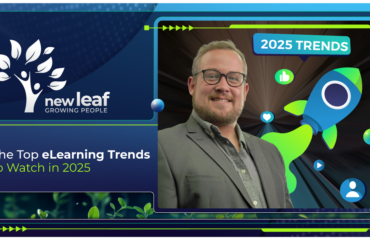
L&D practitioners or HR staff in charge of healthcare workforce development face the daunting task of continuously upskilling a diverse workforce consisting of clinical and non-clinical employees. This means planning out and building equally diverse learning paths, modules, and eLearning content.
Enter personalised eLearning, a transformative educational approach that tailors the learning experience to individual learners’ unique needs, learning pace, and preferences. Regarded as one of the biggest eLearning trends for 2025, this personalisation is powered by cutting-edge technologies such as AI, big data and learning analytics. Students can undergo continuous assessment while receiving timely feedback, which helps them address knowledge gaps and build personal learning paths.
A systematic review by Wang et al. (2020) explored personalised learning’s efficacy in medical education. The study showed that personalised learning, facilitated by learning management systems (LMSs), adaptive learning technologies, and virtual patient simulations, positively influenced student critical thinking skills, knowledge retention, and clinical performance.
It works well because adaptive learning and customised content address individual learner needs, specific roles, and organisational challenges. Personalised, scalable healthcare training programs empower students to take charge of their learning journey; they have the potential to not only end the quiet quitting epidemic but also to revolutionise how knowledge is acquired and retained.
Enhanced Learning Engagement
The adoption of AI-based technologies is changing how healthcare workers acquire new skills. AI technologies increase engagement by:
- Reducing repetitive chores
- Offering personalised learning content that adjusts to each learner’s needs
- Monitoring progress
- Providing real-time feedback
- Using cutting-edge simulation techniques for immersive learning.
For example, healthcare workforce development may include a junior nurse who needs foundational training in infection control and an experienced practitioner who requires an advanced module on emerging pathogens. Admin and managerial staff, on the other hand, may need upskilling in compliance and data security. Adaptive learning delivers the right content at the right time to the right learner, increasing engagement and improving learning outcomes.
Addressing Role-Specific Needs
Healthcare organisations have diverse training requirements depending on their workforce, specialisations, and regulatory obligations. For instance, to ensure that eLearning for healthcare compliance, clinical skills, and administrative training are all role-specific, educators must set specific learning objectives and design tailored pathways through customised eLearning content modules.
For example, doctors and specialists would access advanced diagnostic tools, AI-assisted treatments, and precision medicine. Nurses and care staff would receive training on bedside care, patient communication, and emergency response, while administrative staff would need training on GDPR, data security, and patient record management.
This is where modern learning experience platforms (LXPs) such as Moodle, aNewSpring, and TalentLMS come in. They allow eLearning modules to be customised to match the organisation’s training needs and processes. This can include creating custom learning paths for a diverse workforce, custom reporting to track relevant metrics, and integration with other business tools and platforms.
Improved Knowledge Retention
Adaptive online learning uses AI-driven technology to assess a learner’s progress and deliver personalised training, improving knowledge retention. It does this by reinforcing critical information through spaced repetition (a scientifically proven technique that reinforces information at increasing intervals, enhancing long-term retention), real-time feedback, and targeted content.
Here are a couple of recent studies that underscore the positive effects adaptive learning techniques have on knowledge retention and critical thinking:
- A study in Medical Teacher found that adaptive learning techniques improved knowledge retention among medical students by 20–30%.
- A University of Pennsylvania study showed that adaptive eLearning reduced training time by 50% while maintaining or improving knowledge retention rates.
- Harvard Medical School reported substantial advancements in critical thinking skills for students using adaptive learning technologies.
- Research in The Journal of Graduate Medical Education found that adaptive simulations helped medical trainees develop stronger decision-making skills.
Scalable and Flexible Learning
Personalised eLearning offers healthcare professionals the flexibility to complete training at their own convenience, ensuring that critical learning takes place without compromising patient care or disrupting hospital operations. This is particularly beneficial in a sector where shift work, emergencies, and demanding schedules make traditional training difficult to implement effectively. Here’s how:
- On-demand training modules allow healthcare workers to access content anytime, anywhere, on hospital computers, tablets or mobile devices.
- Adaptive eLearning platforms let professionals pause and resume training as needed.
- Short, modular lessons of 5–10 minutes each allow healthcare workers to absorb essential knowledge in small increments.
- AI-powered eLearning platforms adjust training content based on learners’ performance, ensuring they only review material they need to improve.
- Through automated reminders and progress tracking, a hospital can ensure all staff complete yearly mandatory training online.
- AI-driven simulations provide hands-on practice without needing to take medical professionals away from real-world care settings.
Identifying and Addressing Knowledge Gaps
Knowledge gaps can hinder clinicians’ ability to perform efficiently, adapt to medical advancements, or meet regulatory expectations. In a high-stakes environment that requires quick, informed decisions, this can lead to a host of issues. For example, professionals may feel underprepared for complex or rare cases, which can cause anxiety, second-guess decisions, and decreased job performance and satisfaction.
In an adaptive learning environment, AI can be harnessed to identify these gaps timeously and can provide targeted interventions to quickly bring learners back up to speed. It can track new medical developments and tailor updates to address individual knowledge gaps regardless of the learner’s role.
Adaptive AI-driven platforms can also identify needs for soft-skills training and make real-time scenario adjustments based on user responses. Or address gaps in eLearning for healthcare compliance and regulatory knowledge by tracking and reinforcing areas where staff struggle.
Aligning with Organisational Goals and Compliance
Any personalised eLearning program must align with healthcare goals and compliance standards to ensure staff meet regulatory requirements. One way to distribute this content organisation-wide is by integrating it with country-specific legal frameworks, such as the European Union’s General Data Protection Regulation (GDPR), the NHS Data Security Standards in the UK or HIPAA in South Africa or the US.
To align organisational goals, healthcare L&D professionals and administrators can include standard franchise hospital staff training protocols in the learning management system. It can include training on, for example, institution-specific infection control measures, electronic health record (EHR) usage, and patient and data safety policies. At the other end of the spectrum, custom eLearning content can simulate crisis situations, such as pandemic response protocols tailored to an organisation’s infrastructure and capabilities.

New Leaf Technologies Offers Scalable Healthcare Training Solutions
Whether admin or managerial staff need upskilling in compliance and data security, or clinicians want to learn about new surgical techniques or drug interactions, you need to provide each staff member with unique and relevant content. Contact New Leaf Technologies to explore our healthcare training solutions — from customisable learning management systems to Training Intelligence and off-the-shelf soft skills and data protection courses.




